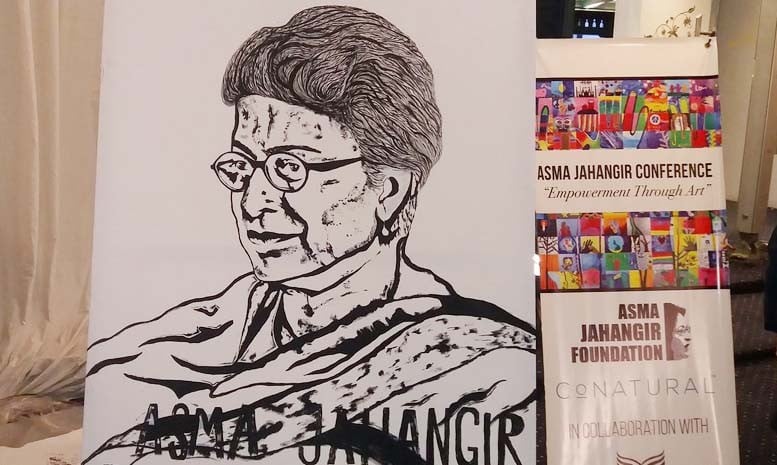
A well-organised and well-attended two-day conference "Justice for Empowerment" held in Lahore last week affirmed that the spirit of Asma Jahangir lives on, continuing to inspire change, action and free thought

The two-day Asma Jahangir Conference that was held in Lahore last week kickstarted with tributes to Asma Jahangir’s remarkable legacy, revered locally and honoured globally, in the form of short films and an ‘Empowerment Through Art’ display. This was followed by serious discussions in the form of panels spread over two days.
The late great Asma’s legacy was celebrated with a commitment towards representation. The sessions explored issues pertaining to, to name merely a few, the rise of religious fundamentalism, the challenges faced by religious minorities, the controversial death penalty, missing persons, empowering women in the legal profession and criminal justice system, mainstreaming transgenders in the justice system, implementation challenges in sexual harassment laws, cyber laws and academic freedom, and gender equality and sustainable development.
I was moved by the heartfelt commitment of everybody involved -- from the hosts and sponsors to the speakers, volunteers and guests from across Pakistan and overseas including judges, barristers, politicians, statesmen, human rights activists, students, the press, and various eager civilians such as myself keen to be part of the narrative and witness the shaping of our nation’s human rights agenda.
"#AJCONF2018 has been the top trending hashtag in Pakistan for both days," remarked Munizae Jahangir, a broadcast journalist and Asma Jahangir’s daughter at the closing panel at the two-day Lahore-based conference dedicated to her mother’s remarkable legacy in law and human rights.
Munizae moderated this multiparty panel that included the PTI’s exuberant Federal Minister for Human Rights, Dr Shireen Mazari, who revealed touching as well as humourous anecdotes from her long-standing friendship with Asma before talking about her government’s human rights challenges and goals. She was joined by Afrasiab Khattak, the former senator affiliated with the ANP along with the PML-N’s Ayaz Sadiq, former Speaker of the National Assembly, who peppered his otherwise sombre speech with light-hearted jibes that included such as teasing Dr. Mazari about her middle name, Mehrunissa.
The truly raucous moment of the otherwise dignified conference occurred thanks to the star power of the fourth panelist, the PPP parliamentarian, Bilawal Bhutto Zardari. Cries of Jiye Bhutto rang through the formerly composed crowd of judges, lawyers, students, journalists and human rights crusaders. "This isn’t a rally," hissed two ladies seated near me. "Why on earth are people getting so excited?" I found myself rising to my feet with the rest to catch a glimpse of Benazir’s smiling son, now 30.
What led to the creation of the AJCONF2018, I asked the organisers. Munizae Jahangir who serves on the Boards of the Asma Jahangir Foundation (AJF) and the AGHS (a trailblazing legal aid cell founded by her late mother Asma Jahangir, now in its 32nd year), said: "There’s only one way to remember our mother Asma Jahangir and that is to fight for her causes, bring her colleagues together and create a platform where voices like hers would have support and would be heard. It’s also a tribute to her to hold it in her hometown of Lahore so that people, especially students, will be exposed to human rights movements in the world and new ideas. We hope they will become the human rights defenders of tomorrow."
Nida Ali, an advocate and Executive Director of AGHS, said: "The conference was conceptualised by Sulema and Munizae and solely organised by AGHS Legal Aid Cell. Of course, we had a conference committee for major decisions."
"The whole idea was to hold legal discourse and an open debate on key legal and human rights issues and come up with recommendations. We had international and local experts at all the sessions, and the resolutions that have come out of these sessions are invaluably specific to the topic at hand. This was not a one-time conference and all recommendations will be published, taken up at appropriate forums and eventually have a follow-up on all these issues to measure any positive outcomes that may have emerged from this discourse."
Nida feels that despite organising 19 sessions "some legal issues and human rights areas could not be included in the agenda despite having back-to-back sessions in three halls over two days. We hope to have more focus on some of these very important issues in the next round. For instance, we had 90 female lawyers from all over Pakistan who especially came to attend the conference. Next year we want to capitalise on the role of women in district bars, even from far flung areas and bring their issues into the discussion and build a network to strengthen their role and participation in Bar politics."
The spirit of Asma Jahangir truly lives on, continuing to inspire change, action and free thought.
The writer is an
author and consultant who tweets @laaleen